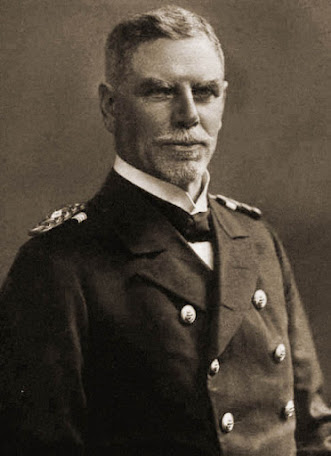Map of the Western Samoa and Eastern Samoa regions
In August 1914, England begged Brit-New Zealand military commanders to form a private armed force and take over a German-Samoan Radio station and trespass openly on German Imperial property. The radios station was abandoned and areas in the building burned before the Nz-British force could raid it. With that illegal act and of other acts overseas in Europe were major factors in bringing about the first World War. Trespassing in Western Samoa being the start of the Naval World War in the Asia-Pacific Polynesian Ocean. The next month in September 1914 Germany attacked in the Atlantic called "The Action of 22 September 1914", a major first ambush where three British cruisers the HMS Aboukir, HMS Cressy, and the HMS Hogue were sunk by the German U-9 submarine killing an estimated 2,000 English Marines. One month later German U-9 was famous again for sinking the HMS Hawke.
German Navy Master Vice-Admiral Graf Maximilian von Spee
In November 1914 the Imperial German Navy attacked as soon as German support could reach Western Samoa after the assault on the Samoan-German Radio Station with first docking in Apia Harbor trying to catch the Brit-NZ 'Advance Party' in dock. The German Imperial Navy commander conversed with several in Western Samoa one being a German-Samoan plantation then left in the direction of The Falkland islands. In the Asia-Pacific between Eastern Polynesia's Rapa Nui and Chile there the Germans engaged British at the "Battle of Coronel 1914" and the German Naval force moved quickly led by Vice-Admiral Graf Maximilian von Spee who with ease defeated the British West Indies Squadron commanded by Rear-Admiral Sir Christopher Cradock. An estimated 1,600 British soldiers were lost with only a few Germans injured (919 British from the HMS Good Hope, 735 British from the HMS Monmouth) a costly and most heavy price payed for the arrogant actions of British New Zealanders. By December of 1914 the Germans were swimming underwater in the English Channel paying back the British attacks still on German overseas allies and stalking their ships. The German U-24 submarine sank the HMS Formidable in British waters as a kick-off to 1915 in the first month of January.
In 1915 the following year after the "German Samoan Radio station act" with New Zealand, it was reported that British and many other merchant trade ships were falling like anchors into the sea, hurt by an underwater invasion of the Atlantic by the superior engineering of the German SM U-9 while the British were still atop the water on old sail vessels. Between January and April, even German Cruiser ships too had sunk several British ships including the William P. Frye, a trading vessel transporting grain but with American workers on board. The German government apologized calling the attack an unfortunate mistake. In May 1915, New York newspapers published a warning by the German embassy telling Washington that Americans traveling on board British ships did so "at their own risk". On May 7th 1915 the British ship RMS Lusitania was torpedoed down by German U-20 off the coast of Ireland killing 1,198 civilians including 128 American civilians in an act of revenge to British trespassing.
The German Government said the British owned RMS Lusitania was carrying munitions and smuggling arms. Three months later in August of 1915 Germany pledged to see to the safety of passengers but in November sank an Italian liner killing 272 people, including an estimated 27 British and Americans. During the summer an estimated 30 ships each month for 4 months straight (around 120 ships) both British military and merchant were sunken.
After the last death tolls the President of the United States began to turn against Imeperial Germany. In the year 1917, the German Empire declared a state of unrestricted submarine warfare against all threats, whether English or French and masters of Western Europe, beginning with the policing of the entire Atlantic Ocean and the United States countered in a new state of War. United States History begins World War declarations officially in 1917 under Woodrow Wilson. Information on overseas attacks were at the time unreliable as to who the aggressors were and reasons for retaliation, and most in the USA public at that time wished to stay neutral.
The United States reformed under the Republican Party after the first World War ended in 1918 and in 1921 the US-Senate declined joining the British and French made "League of Nations". The League of Nations failed and were eventually disbanded being a major cause of the next World War. On July 2nd 1921, the new President of the United States Warren G. Harding signed the US-German Peace Treaty and the US. remained under an agreement of US-German neutrality for the next 19 years in US-Republican Party hands. The USA did not officially join World War 2 until the Japanese Empire attacked the USA at Pearl Harbor in Hawaii.
Related articles:




 Posted in:
Posted in: 







































